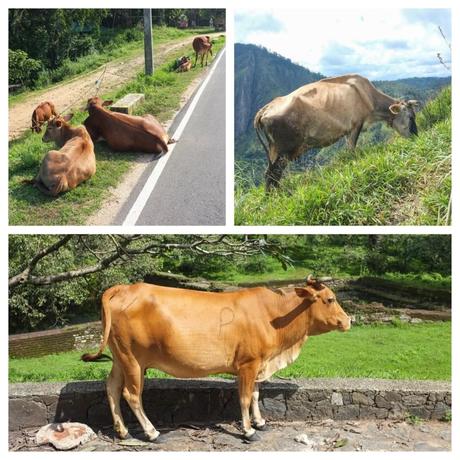Monkeys are as common in Sri Lanka as mosquitoes (and geckos). You’ll see them in trees, on roof tops, electricity lines, and anywhere you can imagine.
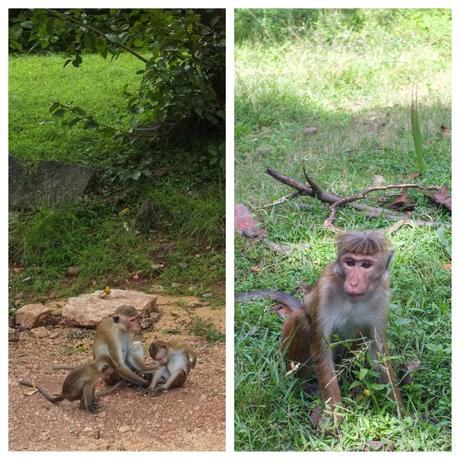
The famous Indian head wobble has me in equal parts hypnotized and amused each time I see it.
Don’t be fooled by guidebooks: the food is quite varied (definitely not limited to only rice and curry), not as spicy as it’s claimed to be (though tourists often get a milder version than what the locals would get, or are at least asked how spicy they would like their dish). It also varies in different parts of Sri Lanka (roti, for example, will be completely different in the southern, central and northern parts of the country).
You’ll often get chilli on the side with your dish, and street vendors will go as far as offer chilli with mango or apples (!).
In guest houses or family-run restaurants, meals often need to be ordered at least 2 hours in advance. And wherever there is no need to order in advance, the preparation time is still very long (no matter if it’s just coffee, toast, plate of fruit or a proper lunch / dinner meal).
Each time a waiter / waitress comes to your table, they will say ‘excuse me’ (unless maybe you’re looking straight at them?).
In non-touristy locations you won’t find any restaurants. It’s best to eat at your hotel or guest house.
Food portions in some locations (like in the central and north-eastern parts of the country) will be beyond generous.
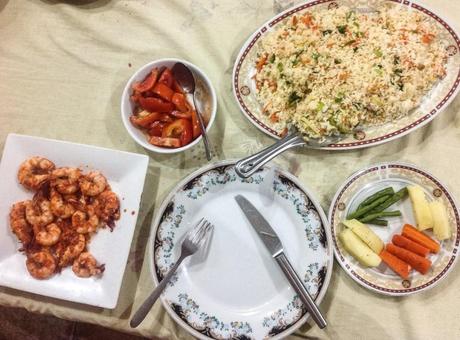
I ordered one dish!
Everyone will call you ‘sir’ / ‘madam’ and say ‘good morning / evening’ (sometimes ‘hello’) and never ‘hi’.
Shops and eateries are locally called ‘hotels’.
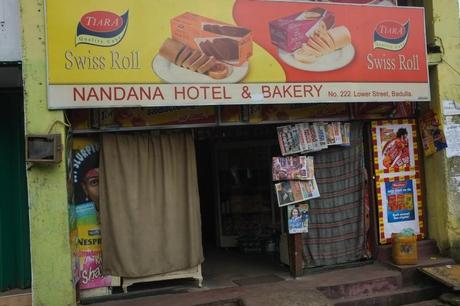
Buses and trains often fill up beyond measure, and whether you get a seat or are standing, you pay the same price.
Bus and train doors are always left open, with people sitting on the stairs or even hanging out of the door.
It’s easier to get a seat on the bus if you’re a member of the clergy than if you’re a mother with a child or an elderly person.
The long-distance buses are usually Indian-style, decorated with Hindu deities, beads, artificial flowers and pompons, and they normally have local or Hindu music blasting from the speakers. At least once they will stop by a street altar and the ticket guy will get off, offer some money and pray.
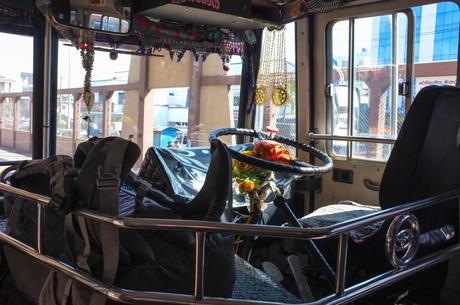
my very own backpack
At every bus / train stop there are vendors coming in with goods ranging from cakes, fruit and drinks to jewellery, lottery tickets, calendars and religious CDs. They will squeeze in no matter how many people are standing in the aisle. Sometimes there are also beggars joining them.
A long-distance bus (non-AC) or train (2nd /3rd class) will be a few times cheaper than a tuk tuk ride from your guest house to the station.
When you walk down the street, every two meters you’ll be stopped by “Hello, good morning!”, “Where you from?”, “Where you going?”.
Toilet paper and towels are never in the room when you check in.
When you ask somebody where you can throw away an empty water bottle, they will give you a strange look. Trash tends to be lying around in street corners, under the fences, etc. Trash cans in the streets are virtually non-existent.
There’s always somebody (if not a whole bunch of people) willing to help you find a bus stop, get on the right bus, get off at the right station, find your destination, etc.
You’re as likely to be hassled by touts and tuk tuk drivers trying to rip you off, as you are to be helped by someone who expects nothing in return. Generally, the people are one of the best things about Sri Lanka.
Locals will sometimes watch you with interest, and other times they will give you no attention whatsoever. But expect stares and giggles in less touristy locations.
The weather tends to change quickly, especially on the coast and in the hill country.
In a lot of places you will be melting from the heat, but in the hill country you will definitely need the long-sleeved clothes you have hopefully brought along, and a couple of blankets at night. Plus a raincoat / umbrella.
In the countryside people bathe in the lakes and rivers (I’ve been told that they only use soap and no shampoo in order not to pollute the environment, but I’m pretty sure I’ve seen somebody brushing their teeth as well). Both men and women wear sarongs during this activity. They also wash their clothes in the same fashion, leaving them to dry on the lake / river bank.
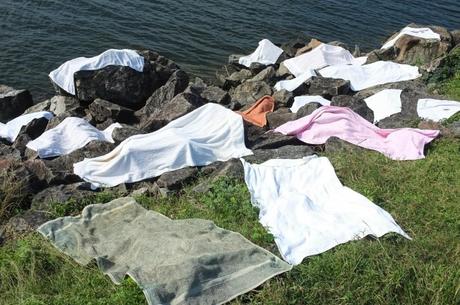
towels drying by the lake in Polonnaruwa
When drinking with a group of people, everyone pours their own drink (no matter who the host is, wherher you’re male or female, etc.). You pour as much as you want to drink, makes sense to me!
It gets dark early, around 6.30pm.
Tea is expensive compared to other drinks (coffee, fruit juices, soft drinks, etc.), and apparently the famous Sri Lankan quality tea is mainly exported.
Aside from rotis, pastries and some local snacks, there is no street food to speak of.
Hygiene in hotels, guest houses, restaurants, street stalls, etc. is generally not Sri Lanka’s strongest point (compared to most of its neighbours in the region, with the exception of India of course).
The fees charged to tourists for the major sights and attractions are exorbitant when compared to what the locals pay for the same.
Service charge of 10% (and sometimes other additional costs) is added to pretty much everything (accommodation, food, etc.).
The beaches aren’t all that spectacular when compared to the Southeast Asian countries.
In the touristy coastal towns the prices of accommodation are quite high when compared to the other countries in the region, while the standards are not exactly upmarket yet.
Road signs will normally be in Sinhala, Tamil and English.
Most people speak English, but many with a heavy accent which can be difficult to understand. English is much stronger in bigger cities like Colombo or Kandy.
You’ll have Buddhists, Hindus, Muslims and Christians mixed across the country. Consequently, in most towns you will find Buddhist temples, Hindu temples, mosques and Christian churches.
Coffee and tea is normally served in pots rather than single cups (which dangerously feeds my caffeine addiction).
Coconut arrack, the local spirit, tastes similar to rum, just sweeter. Great with Coke!
Coconut marketing in Mirissa is strong

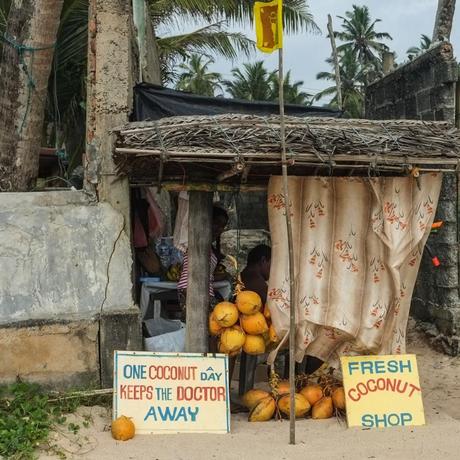
Ladies and gentlemen, we’ve been lied to!
Among other travellers, the measure of how seasoned a traveler you are will be whether you’re going to Jaffna (located in the more remote and much less frequented north, which still bears signs of the civil war that ended in 2009).
Planning your journey from point A to B, don’t measure the distance in kilometers, but rather think in terms of road quality, geography (hill country), amount of traffic (cities) and traveling time.
Lottery tickets are sold at every corner.
People don’t look after animals much. There are lots of stray dogs and cats everywhere, and they are a very sad-looking lot. On top of that, you’ll often be told to be careful, because some of them may have rabies.
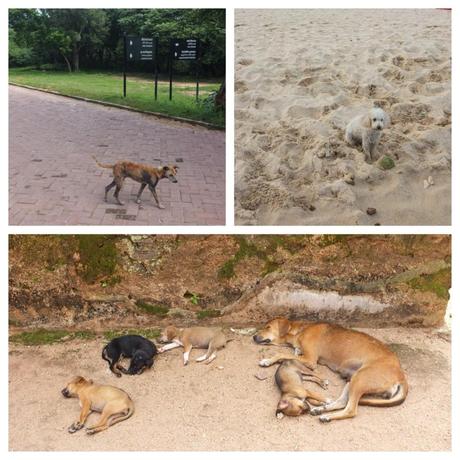
Cows are roaming around freely in smaller towns, eating grass (and sometimes trash) or simply chilling.
